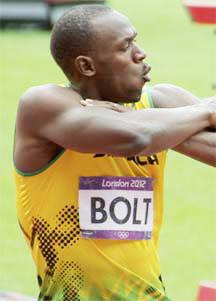LONDON, (Reuters) – Organisers of the 2014 Commonwealth Games in Glasgow have seen an upsurge of interest from fans and sponsors on the back of Britain’s success in hosting the Olympics this summer.

The Glasgow Games, involving athletes from 71 countries and territories, are the next major sporting event Britain will stage and the Scottish city is hoping to attract Olympic gold medallists such as Jamaican sprinter Usain Bolt and British heptathlete Jessica Ennis.
“Already, we’ve had an increase in the interest not just on a Scotland-wide basis but on a UK-wide basis. People want more of this,” David Grevemberg, the American who is chief executive of Glasgow 2014, told Reuters.
“It’s created a buzz. We do expect some events to be absolutely sold out,” said Grevemberg, also noting interest from people in Commonwealth countries around the world in volunteering to help at the event.
Athletics will be staged at Hampden Park, Scotland’s national soccer stadium, on a temporary athletics track where the capacity for the Games is expected to be 43,000 people.
Speaking on the sidelines of a British government conference on delivering world-class sports events, Grevemberg said ticket prices and policies were still being finalised. Lessons had been learnt from London where problems with sale of tickets online and high prices caused frustration for fans.
He said tickets would be distributed in a variety of ways to make the Games as accessible as possible to people from all backgrounds.
TELEVISION DEALS
Glasgow, Scotland’s largest city, is seeking to raise 100 million pounds ($159 million), or around 20 percent of the Games budget, from commercial activities including sponsorship, television deals and ticket sales.
U.S. computer maker Dell recently became the seventh company to sign up as a sponsor and more are expected to follow in coming weeks.
“We’ve had tremendous traction in the market. The buzz of London has really created interest,” said Grevemberg, formerly director of sport for the International Paralympic Committee.
The Commonwealth is a loose alliance made up mainly of former British colonies. Its political influence has waned over the past few decades and the Games themselves face a battle for relevance in the global sporting calendar.
Grevemberg said Glasgow was working hard to make sure the top names made it part of their programme to go to Scotland in 2014.
“We are working with international federations, we are engaging athletes directly to make sure the platform is set for these athletes,” he said.
He said the British government had given overseas athletes tax exemption on earnings during the Games, removing one potential hurdle, and added that many of them had a strong UK brand to burnish.
“On the road to Rio (2016), it is a very valuable proposition,” he said.
Scotland will compete as an individual nation at the Games and some fear that the Scottish National Party will use Glasgow for political ends ahead of a referendum on independence from Britain likely to be held the same year.
Grevemberg said he wanted to stay out of party politics.
“Our key is to make sure we do what we are there to do: run a fantastic Games for the Commonwealth,” he said.





